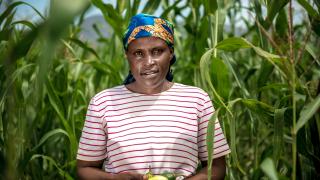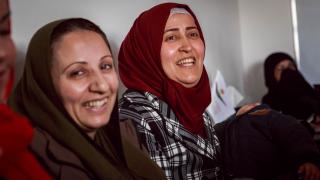Women for Women International's Response to the UK Government's Strategy for International Development
The UK Government must go further to ensure they listen to marginalised women and girls to inform their approach to International Development
Yesterday, the Foreign, Commonwealth and Development Office (FCDO) published its long-awaited International Development Strategy, setting out the UK Government’s approach to international development for the next ten years.
Women for Women International welcomes the prioritisation of women and girls within the strategy. From our work over the last 29 years, we know that women and girls are disproportionately impacted by conflict, crisis and inequality – and so we are pleased to see this commitment, as well as the intention to step up humanitarian work and to tackle climate change, prevent conflict and improve global health. The rights and needs of women and girls must be embedded across all of these focus areas, and not considered in isolation.
Additionally, Women for Women International has long advocated for policies and programmes to be based on evidence (including from unofficial data sources) and meaningful consultation, and for the provision of long term, core and flexible funding to local women’s rights organisations. Based on that, we note the references in the strategy to work being “locally owned” and to people having “a voice in what we do and how we do it.”
We are, however, disappointed that the strategy fails to outline how this progress will be meaningfully achieved in practical and measurable terms. For example, while some mention has been made to ensuring that funding for women and girls is restored, it is unclear what this will look like, how much funding will be restored and when.
Similarly, the commitment to spend £3 billion over three years on humanitarian assistance falls short of what is needed to respond to current conflicts and crises – including in countries where Women for Women International and our partners work, such as Afghanistan, South Sudan, Ethiopia and Ukraine. The International Development Strategy must be matched by a return to the funding levels from 2020, before huge cuts were made to UK Aid – including Women for Women International’s own UK funded programme in Bauchi State, Nigeria.
While the International Development Strategy has clear shortfalls, the FCDO has an opportunity for the upcoming Women and Girls Strategy to take a clearer evidence-based approach to addressing structural and systemic barriers. This must include taking an integrated approach to gender within conflict response, humanitarian assistance, climate change and health policy. The Women and Girls strategy must outline how the FCDO will meaningfully engage with marginalised women and girls. This will ensure that women have their voices heard; that their contributions shape the future of their communities and countries in sustainable ways and their full potential is achieved.
Learn more
Following the UK Government's inquiry into extreme poverty, we set out the challenges the Government face to ensure their approach to extreme poverty meets the needs of marginalised women living in conflict-affected countries.
Our Global Advocacy Manager, Stephanie Siddall, discusses global progress towards gender equality and what more we must do to ensure that the most marginalised women and girls aren't left behind.
Policy and Advocacy Partnerships
subtitle:
We are stronger together. That is why we work with networks and strategic partners to greater amplify the voices of the women we work with. Explore the key networks and coalitions we participate in and some of our partnership projects.


